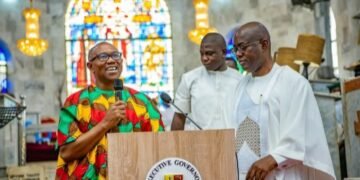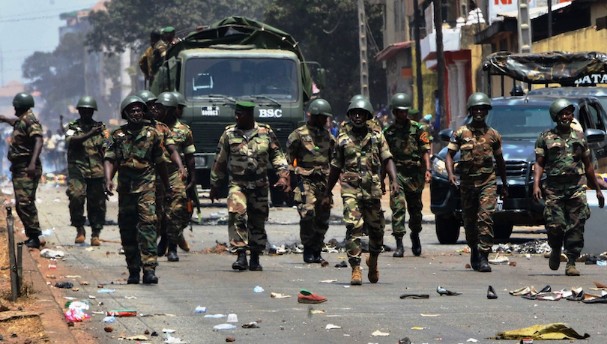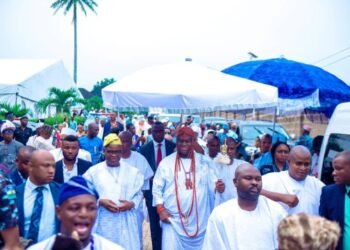Reminiscent of the 1960s, up to the late 1980s when military coups were the fad in Africa, there has been increasing incursions of men in khakis into the body polity of the Continent recently.
In quick succession, there were military coups, albeit bloodless, in some countries in neighbouring West-African sub-region, as well as in faraway Central Africa and North-eastern Africa.
Indeed, and quite rightly, the West-African sub-region and the Sahel have come to be described as the Coup Belt, given the high prevalence of coup d’états in the sub-region.
Between 2020 and 2023, the military struck in Burkina Faso, Guinea, Mali and Niger in West-Africa, Chad, Gabon in Central Africa and Sudan in North-eastern Africa.
More worrisome about these military interventions, which some people have, rightly or wrongly, termed as the beginning of revolution, is that their tidal waves are being felt across the entire Continent and beyond.
In actual fact, the coups have, quite expectedly, been receiving wide condemnations and commendations, within the Continent and globally.
The coup in Niger Republic elicited, and is still generating reactions across Africa and outside the Continent, more especially as France, Russia and, of late, the United States of America (USA) have shown more than passing interests in the forceful change of government in the affected country.
Within the West-African sub-region, the Economic Community of West African States (ECOWAS) has declared that the military action in Niger was nothing but an anathema to democratic norms. Hence, for them, democracy should be restored by all means, not ruling out the option of using military forces against the coupists.
Those against the coups are quick to say military governments rule the people by decrees; without respect for the rule of law and the judiciary; and that the military is against any form of agitation or protest, either peaceful or otherwise.
Those in support however said one common denominator in most of the bloodless coups, especially in Niger Republic and Gabon, is that it was a reaction against long years of bad leadership.
Wikipedia defines coup d’état as an illegal and overt attempt by the military or other government elites to unseat the incumbent leader by force. On the other hand, it also defines self-coup as an instance when a leader, having come to power through legal means, tries to stay in power through illegal means.
In the African Continent today, there are quite a number of leaders who have continually perpetrated themselves in office, either as presidents or prime ministers, and often by undemocratic or unconstitutional means.
90-year-old President Paul Biya of Cameroon, has been ruling for 41 years; 81-year-old Teodoro Obiang of Equatorial Guinea, (44 years); 79-year-old Denis Nguesso of the Republic of the Congo (38 years) and 79-year-old Yoweri Museveni of Uganda (37 years).
Also, 74-Isaiah Afwerki has been ruling Eritrea for more than 30 years; 63-year-old Paul Kagame of Rwanda (29 years); 73-year-old Ismail Omar Guelleh of Djibouti (24 years); 79-year-old Hage Geingob of Namibia (34 years); and 53-year-old Faure Gnassingbé of the Republic of Togo (18 years).

What then really is the interest of the western powers in the affairs of Africa? Put differently, “Do they have any ulterior motives beyond the need to protect democracy and promote development?
These questions became pertinent, given the duplicity of the actions and reactions of these superpowers to the domestic affairs of many of these so-called independent countries but which are, indeed, still tied to the apron strings of the West.
Going down the memory lane, France and Britain were among other European countries that came rushing to Nigeria in 1984 to congratulate the then Major General Muhammadu Buhari who had successfully toppled the democratically elected civilian government of the late former President Shehu Shagari in a coup that the claimed the life of an army officer, Brigadier Bako, on 31 December, 1983. What has changed between then and now?
If the western powers are truly interested in the entrenchment of democracy, as they would want us to believe, why are they not concerned in the affairs of their business partners in the Middle East, especially in the Arab World where long-term monarchies are holding sway?
Taking a retrogressive step on the heels of the coups or upheavals, two African countries, Uganda and Rwanda retired their long serving senior military generals and released what they termed lifetime packages for them.
President Museveni of Uganda retired a total of 110 army officers, including 17 Colonels; 13 Lt. Colonels and 63 Majors, saying their retirement is not a redundancy but “it is like a mutation, from one form of service to another one…”
Towing same line, President Kagame of Rwanda gave his approval to the decision of the country’s Defense Force to retire 12 generals and 1,013 military officers from the Army.
Coincidentally, Museveni and Kagame are among the aforementioned living longest serving presidents in Africa. But the question is: “How many military officers can the African leaders send into retirement in order for them to retain their holds on their respective countries?
One common denominator in most of the recent coups is that they are bloodless. More so, there seemed to be genuine public acceptance of the coupists. This is especially the case in Niger Republic and Gabon. Most observers thus saw the coups as upheavals and a revolution namely, a reaction against long years of bad leadership across most countries in West-Africa and the Sahel.
It is in this wise that the Gabonese experience is seen as a torrential current, moving on a fast lane across the Continent. The wind of change is currently blowing through Africa. Which African country is next? What can be done to stem the rising uprisings and upheavals, coming in the garb of military coups?
Things are extremely too tough and getting difficult by the day in most parts of the African Continent. Hopelessness and despondency have taken over. Almost everywhere is becoming unsafe with the high level of despair and suffering, while politicians and elected public office holders flaunt their ill-gotten wealth in the face of the have-nots.
It seems Africans are now determined to take their destinies into their own hands, considering the wide jubilation by the people of Gabon immediately the military took over in that country last month.
Some respected voices differed on the recent coups. While they agreed that the worsening situation in most of the countries must change, some were of the view that the coupists were not grounded in principle to understand the essence of leadership. They also opined that the coupists may be carried away by the euphoria of the moment and turn out to be worse than the oppressive politicians they chased out of power.
One thing however stands out clearly in the latest happenings in the Continent namely, the oppressed are becoming more forceful in their agitations against long years of suppression and repression.
Sitting democratic governments across Africa should take a que from the happenings around them. They should wake up from their slumber and be alive to their responsibilities. African democracies should buckle up and stop toying with the welfare and social security of their citizens.
African political leaders should start doing the right things. They should stop being too rigid, greedy, selfish, callous and insensitive to the plights and sufferings of the hapless people they were elected to serve.
Indeed, there should not be any moral justification for coups, uprisings or upheavals in any society where respect for human dignity, keeping to the provisions of the constitution to enhance the best of human values and entrenchment and promotion of good governance are sacrosanct. Africa must not be an exemption to the basic rules guiding the essence humanity.
•Falade is the Publisher/CEO of Newscoven.ng




























